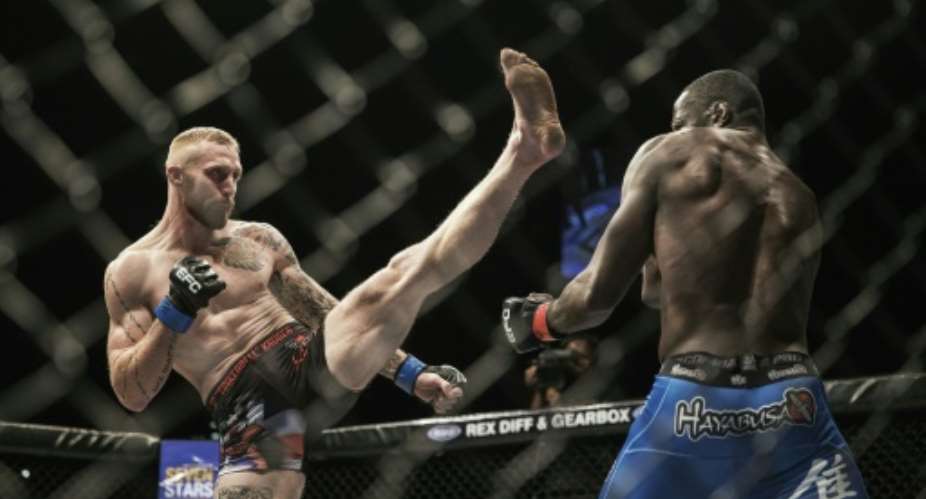Johannesburg (AFP) - Demarte Pena was too young to fight in Angola's civil war, where his family played a major role, but he has fought his way to a mixed martial arts championship.
Instead of an AK47, "The Wolf" as he is known in the ring, uses fists, feet and pure muscle to subdue his opponents in what is seen as one of the fastest growing sports in Africa.
Pena is bantamweight champion among the new crop of mixed martial arts fighters in Africa's only professional MMA body, the Extreme Fighting Championship (EFC).
"Nothing challenges you more than fighting another man," the 26-year-old told AFP during a break from training in a gym north of Johannesburg.
"The Wolf" was barefoot in a section with padded flooring where he had been perfecting his technique in kickboxing, grappling and locks aimed at forcing an opponent to tap out and surrender.
"People still don't understand that it is a sport first and foremost, and it's regulated...you don't just come and try to kill each other.
"The blood just exaggerates the whole thing," he said.
Pena, who grew up in the mean neighbourhoods of Luanda during the dying years of the civil war that ran from 1975 to 2002, comes from a family of war-time combatants and considers himself a natural born fighter.
His great-uncle Jonas Savimbi was the feared founder and leader of the rebel movement UNITA that fought against the ruling People's Movement for the Liberation of Angola (MPLA). Savimbi was killed in 2002, basically bringing the war to an end.
But it was the death of Demarte's father, Arlindo "Ben " Pena, a UNITA general, in 1998 that prompted his family to move to South Africa, where Demarte has become a dominant force in EFC.
- 'Hard work and mental fitness' -
The undefeated champion says the sport "requires a lot of hard work and mental fitness"-- dismissing the notion that it is simply a no-holds-barred fight fest.
"Once you are out there in the ring, your survival mode kicks in."
Having conquered all in fights in South Africa, the champion now hopes to fight in front of his people in Angola, where he says support for the sport is burgeoning.
"I believe that fighting in Angola would legitimise me as an athlete...it would be a highlight of my career," he said.
Formed in 2009, the EFC is now a launchpad for fighters across the continent -- where traditional sports like football dominate -- and other parts of the world.
EFC may be a small player compared to the US-based Ultimate Fighting Championship (UFC) but it has helped transform the little known sport once dogged by an image of thuggery and unlicenced violence.
These days thousands of avid fans throng arenas to watch adrenaline-packed fights, with some live TV broadcasts drawing more than 1.5 million viewers.
British fighter Yannick "Black Mamba" Bahati recently claimed the middleweight title after defeating local favourite JP "Tinkerbell" Kruger at a venue south of Johannesburg packed with young and old fanatics.
All eyes were on the hexagonal ring, the battlefield for the shirtless and heavily tattooed fighters who kick, punch and grapple each other into submission to wild cheers from the fans.
- Controversy -
"Support is growing all over the continent...it has been fantastic," said EFC boss Kairo Howarth.
EFC attracts fighters from countries including Ivory Coast, Nigeria, Angola, Zimbabwe and Mozambique, with 120 athletes under contract.
"If you look at Africans in general, we have great physically built men," said Howarth. "We attract the best."
He said perceptions of the sport were improving, with television coverage reaching more than 110 countries worldwide and attracting sponsors.
"The stigma comes from people who are ill-informed. There are rules, divisions and a whole regulation side to it," he said.
But the sport has never been without controversy.
In 2014, EFC middleweight fighter Booto Guylain died from head injuries suffered during a fight.
According to Howarth, Guylain's death prompted the organisation to reconsider its safety standards and made brain scans compulsory before and after every fight.
"We told ourselves that let's do as much as we can to ensure that it doesn't happen again," said Howarth.
Despite the impressive growth of the sport, Africa's MMA stars lack the financial muscle of traditional sportsmen. They are only paid per fight, and fights are infrequent.
Some take on additional jobs in fields such as personal training and private security to make a living.
But for Pena and many others, the ultimate goal is to fight in the prestigious US-based UFC.





 SSNIT must be managed without gov’t interference – Austin Gamey
SSNIT must be managed without gov’t interference – Austin Gamey
 Ejisu by-election could go either way between NPP and independent candidate — Gl...
Ejisu by-election could go either way between NPP and independent candidate — Gl...
 We never asked ministers, DCEs to bring NPP apparatchiks for returning officer r...
We never asked ministers, DCEs to bring NPP apparatchiks for returning officer r...
 No one denigrated the commission when you appointed NDC sympathizers during your...
No one denigrated the commission when you appointed NDC sympathizers during your...
 Used cloth dealers protests over delayed Kumasi Central Market project
Used cloth dealers protests over delayed Kumasi Central Market project
 A/R: Kwadaso onion market traders refuse to relocate to new site
A/R: Kwadaso onion market traders refuse to relocate to new site
 Dumsor: Corn mill operators at Kaneshie market face financial crisis
Dumsor: Corn mill operators at Kaneshie market face financial crisis
 Jamestown fishermen seek support over destruction of canoes by Tuesday's heavy d...
Jamestown fishermen seek support over destruction of canoes by Tuesday's heavy d...
 Election 2024: EC to commence voter registration exercise on May 7
Election 2024: EC to commence voter registration exercise on May 7
 Public schools rebranding: We’re switching to blue and white, we’re painting all...
Public schools rebranding: We’re switching to blue and white, we’re painting all...
